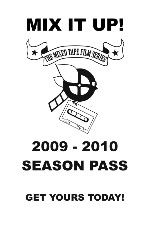Fast Food Nation is empty calories.
 Richard Pryor once said that it isn’t difficult to love someone “if you just spend a little time with them.” It is a beautiful and profoundly hopeful idea that the boundaries between people are impermanent and might be removed with nothing more complicated than a little personal interaction. It is also an idea Richard Linklater seems to share in his newest film, Fast Food Nation, which ‘spends a little time’ with an ensemble cast of tangentially related characters representing a wide range of social classes from the marketing executive to the rancher down to the illegal immigrant.
Richard Pryor once said that it isn’t difficult to love someone “if you just spend a little time with them.” It is a beautiful and profoundly hopeful idea that the boundaries between people are impermanent and might be removed with nothing more complicated than a little personal interaction. It is also an idea Richard Linklater seems to share in his newest film, Fast Food Nation, which ‘spends a little time’ with an ensemble cast of tangentially related characters representing a wide range of social classes from the marketing executive to the rancher down to the illegal immigrant.
Based on the book by the same name, the film deals with the results of corporatization on the people of  restaurant chain to determine how feces is getting into the beef. His movement down the ‘food chain’ in search of the source of the problem allows the story to follow the exploits of a heartless corporate facilitator, a cantankerous old rancher, an idealistic young cashier, and a hard-working young Mexican couple.
restaurant chain to determine how feces is getting into the beef. His movement down the ‘food chain’ in search of the source of the problem allows the story to follow the exploits of a heartless corporate facilitator, a cantankerous old rancher, an idealistic young cashier, and a hard-working young Mexican couple.
However, the film complicates the presentation of these socio-economically diverse people by showing how each are trapped in a fashion not dissimilar to the cattle on which they feed. From Bruce Willis’ cameo as a beef buyer with no illusions about the nature of the industry who greedily devours hamburgers while simultaneously discussing the feces content of the beef, to Kris Kristofferson’s rancher who battles to protect his grazing land from encroaching condominiums, from the young cashier who quits her job because she senses the dehumanizing nature of the industry and who impotently attempts to change things, to the illegal immigrants whose cheap labor allows for low prices and who are ultimately both figuratively and literally ground up in  the machines of corporate America, back to Greg Kinnear’s marketing executive who begins to recognize the dehumanizing nature of a fast-food nation but who can do nothing to change things without risking his family’s financial security, each are trapped by a system which commodifies, packages, and sells everything with which it comes into contact, including the packagers and consumers themselves.
the machines of corporate America, back to Greg Kinnear’s marketing executive who begins to recognize the dehumanizing nature of a fast-food nation but who can do nothing to change things without risking his family’s financial security, each are trapped by a system which commodifies, packages, and sells everything with which it comes into contact, including the packagers and consumers themselves.
As scenes of cows crammed into pens blend into scenes of hotel rooms crammed with immigrants, and as scenes of concerned characters unable to do anything to change the great machine of commodified America blend into scenes of cows so stupefied and sated by a steady supply of food that they refuse to leave their pens when given the opportunity, Linklater makes a powerful statement about the state of things. This is where the movie excels. In spending a little time with such diverse characters, Linklater forces the viewer to accept that, like it or not, all Americans are in the same boat as the minimum wage cashier or the illegal immigrant. As the Book of Linklater states, “What is done unto the least of minimum wage workers is done also unto thee.”
However, despite the great message the film ultimately falls flat. Linklater attempts to provide a How-To Guide for Social Change in the form of the patented Linklater Lecture, a longwinded didactic speech full of sound and fury but ultimately signifying nothing more than social discontent. When he is being less subtle, he presents viewers with some of the most graphic scenes of gore this reviewer has ever witnessed. However, grossing out an audience is good for little more than making the audience sick. These two overly obvious methods actually undercut the work of the humanizing elements of the film and reduce the message to little more than a gory lecture. In preparing his scathing indictment of the fast food industry, Linklater might have taken a page from corporate 




0 Comments:
Post a Comment
<< Home